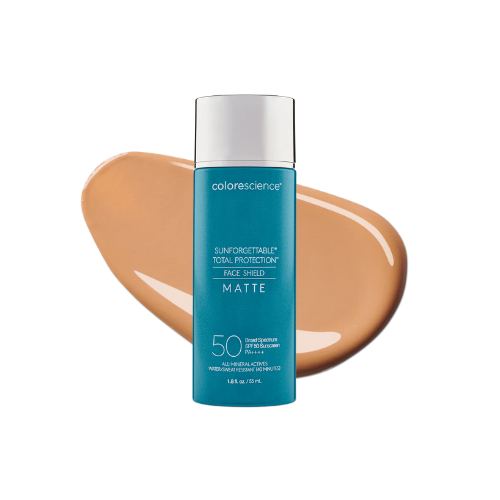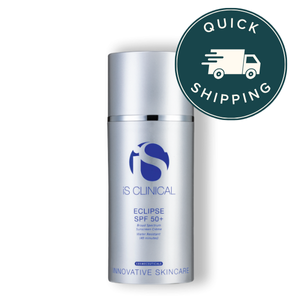Best SPF for Your Skin Type
An Esthetician’s Guide to SPF
Summer’s right around the corner, and so are the days that we’re out enjoying the sun! As we all know by now, the sun can be our best friend and also our worst enemy. Too much sun exposure not only causes dark spots and hyperpigmentation, it also causes the skin to age much faster and worse. It’s the number one culprit of skin cancer - but we all can avoid these and enjoy the sun responsibly by applying sun protection, aka sunscreen!
Thanks to modern science and technology, there’s a wide range of sunscreen options suitable for your skin type. It can get overwhelming but that’s why your estheticians are here to help!
Understanding SPF Labels
The main reason why understanding SPF labels is important is because you can get an idea of how a product is going to protect your skin from UVA and UVB rays.
-
Broad Spectrum simply means it protects you from both UVA and UVB rays from the sun. Both of these ultra violet rays increase the likelihood of skin cancer. Ultraviolet A (UVA) has a longer wavelength. It is associated with skin aging. Ultraviolet B (UVB) has a shorter wavelength. This one’s associated with skin burning. It is vital to have a broad spectrum sunscreen as it can protect you from both of these rays simultaneously. Not all sunscreens are broad spectrum, so it is important to look for it on the label. For broad protection, check the ingredients list, look for sunscreens with avobenzone, zinc oxide or titanium dioxide, all of which block UVA.
-
SPF (Sun Protection Factor) is a measure of how well a sunscreen protects the skin from sunburn. It is a measure of how many harmful ultraviolet rays (UVB) it absorbs or reflects away from your skin. Contrary to common misconception, it is not directly related to time of solar exposure but to the amount of solar exposure. An SPF 15 sunscreen blocks 93% of UVB radiation, and SPF 30 blocks 97%. After that, the difference in protection is small.
-
Mineral, or physical, sunscreens (zinc oxide/titanium dioxide) act as a physical barrier between the skin and the sun. It deflect and scatter the rays before they penetrate to the skin. They’re usually recognizable as those sunscreens with ‘white casts’. It doesn’t absorb into the skin, unlike its chemical counterpart.
-
Chemical sunscreens absorb UV rays and then change their chemical structure, converting the sun’s radiation to heat energy. Most chemical sunscreens contain at least one of the following active ingredients: oxybenzone, octinoxate, cinoxate, dioxybenzone, ensulizole, homosalate, meradimate, octisalate, octocrylene, padimate O, sulisobenzone, and avobenzone. They come in both cream and spray form.
Pro-Tip:
To get the full SPF protection noted on the bottle, you need to apply the sunscreen liberally and evenly (use your peace fingers to measure how much you should apply for every part of your body, especially your face) and reapply every after 2 hours.
The Best SPF’s by Skin Type
Skin Type: Dry/Sensitive
Look for sunscreen that doubles up as a moisturizer. Specifically, mineral sunscreens with titanium dioxide or zinc as the active ingredients. They are generally less irritating to the skin. Ingredients such as hyaluronic acid, nicotinamide/niacinamide (a form of vitamin B3), and vitamin C are great ingredients to look for. You’d also want to avoid products with alcohol, preservatives, fragrances, and oxybenzone.
Top Picks for Dry/Sensitve Skin
〰️
Top Picks for Dry/Sensitve Skin 〰️
Glymed Plus Moisturizing Protection Cream with SPF 15
Broad Spectrum: Yes
SPF rating: 30+
Mineral or Chemical: Mineral
Sorella Apothecary Quench & Protect Hydrating SPF 30
Broad Spectrum: Yes
SPF rating: 30+
Mineral or Chemical: Mineral
Skin Type: Oily/Acne-Prone
Look for lightweight formulations that are specifically made for oily skin. Products with niacinamide can help with the redness as well as anything soothing such as green tea and chamomile.
Top Picks for Oily/Acne-Prone Skin
〰️
Top Picks for Oily/Acne-Prone Skin 〰️
Clearstem SUNNYSIDEKICK
Broad Spectrum: Yes
SPF rating: 50+
Mineral or Chemical: Mineral
Colorscience Sunforgettable® Total Protection™ Face - Matte
Broad Spectrum: Yes
SPF rating: 50+
Water resistant
Mineral or Chemical: Mineral
Skin type: Normal
Ah, the lucky ones. Finding the perfect sunscreen is a matter of preference, and mostly focuses on preventative measures to battle out signs of aging.
Top Picks for Normal Skin
〰️
Top Picks for Normal Skin 〰️
Antedotum Essential Daily Sunscreen
Broad Spectrum: Yes
SPF rating: 30
Blue Light Protection
Mineral or Chemical: Mineral
iS Clinical Eclipse SPF 50+ Untinted
Broad Spectrum: Yes
SPF rating: 50+
Water resistant
Mineral or Chemical: Mineral
Skin Type: Combination
Depending on the combination, sunscreen you should look for when you have this skin-type should depend on what your main concern is. Regardless, opt for lightweight formulations that are non-comedogenic to avoid skin irritation.
Top Picks for Combination Skin
〰️
Top Picks for Combination Skin 〰️
Clearstem YOUARESUNSHINE Sheer Broad Spectrum SPF 50+
Broad Spectrum: Yes
SPF rating: 50+
Mineral or Chemical: Mineral
Sorella Apothecary Quench & Protect Hydrating SPF 30
Broad Spectrum: Yes
SPF rating: 30+
Mineral or Chemical: Mineral
Your SPF matters
While any sunscreen is better than no sunscreen at all, choosing the most appropriate formulation for your skin type will give you optimal protection. With all these tips, I hope you can confidently find the sunscreen of your dreams, one that you wouldn’t mind wearing, even when you’re just lounging at home. Sunscreen is the most important part in your morning skincare routine so having the right sunscreen increases the chances of it becoming an enjoyable part of your daily routine.
As always, if you have any questions, don’t hesitate to contact your Pomp Esthetician for their recommendations.
Sources:









